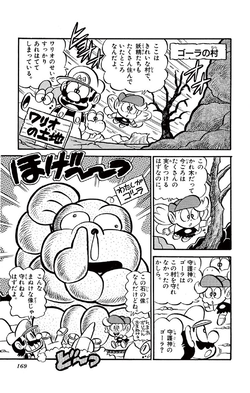Gōra no Mura
The title of this article is official, but it comes from a non-English source.
If an acceptable English name is found, then the article should be moved to the new title.
| Gōra no Mura | |
|---|---|
 Wanda shows the ruined village and the divine statue of Goro | |
| First appearance | Super Mario-kun Volume 11 (1994) |
| Greater location | Wario's Woods |
| Inhabitants | Sprites, Goro |
Goro no Mura is the Sprite village that appeared in chapter 15 Super Mario-kun Volume 11, located in Wario's Woods. It is a normal forest clearing where its only landmark being a statue of the local guardian god and namesake of the village: Goro.
Wanda leads Mario, Luigi, Yoshi, Toad, and Birdo to the village, now in ruin, with trees and plants withering, after Wario's takeover. The villain, having heard of their arrival, arrives in the village and animates the statue of Goro and the sics it at the heroes. Wanda, trapped in a bubble, transfers her magic into the ground, giving life to a nearby tree and making bombs grow on it. However, the bombs are useless against Goro, so Wanda suggests using them on the monster to collect Diamonds to toss at Goro. The heroes execute the plan and, after Yoshi eats the Diamonds, turning in Daiya Yoshi, he is tossed at Goro, breaking the statue and defeating it. Wario flees and the village returns to the natural statue, making the statue smile in his last moments of movement.
Names in other languages
| Language | Name | Meaning | Notes |
|---|